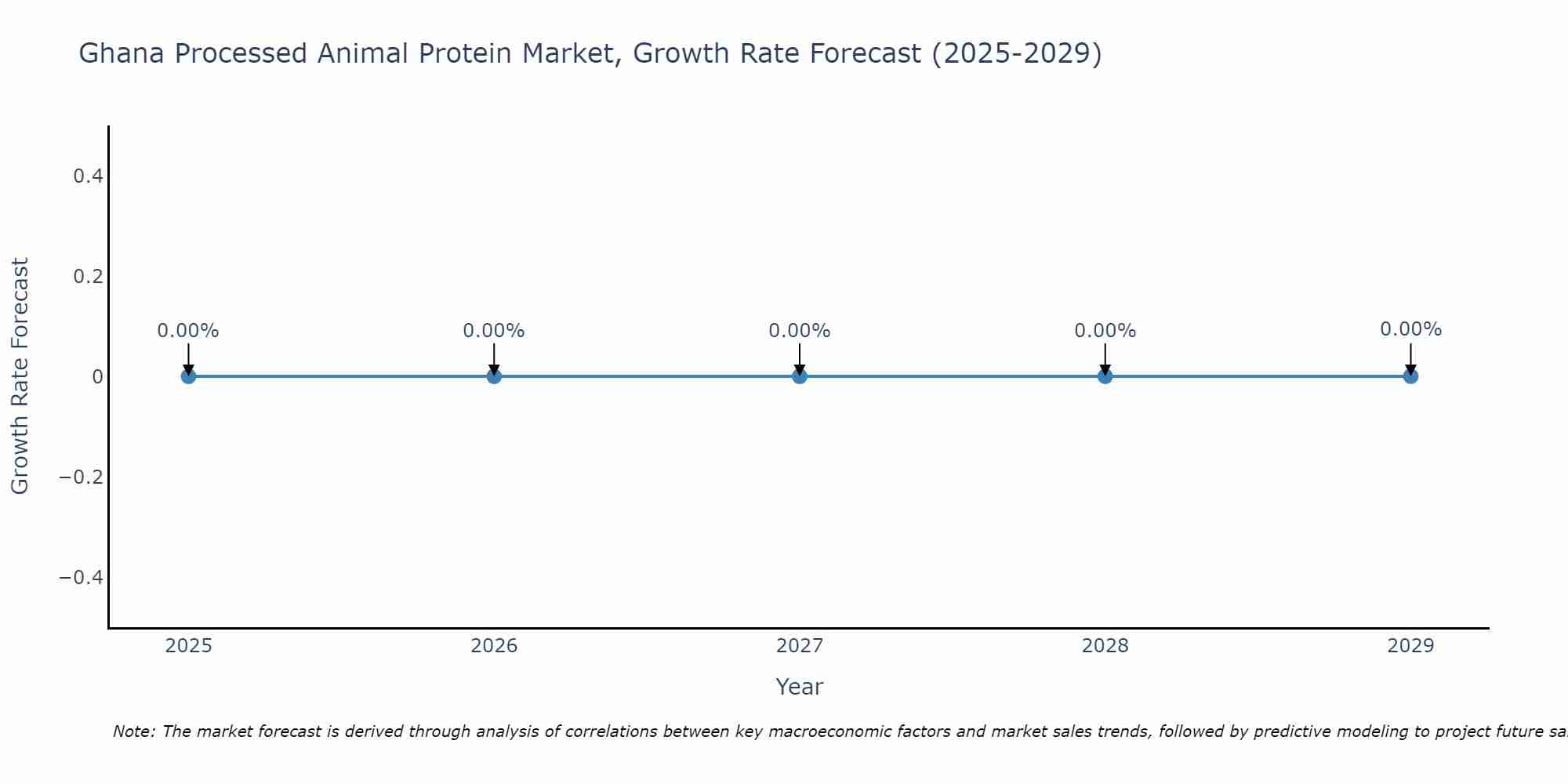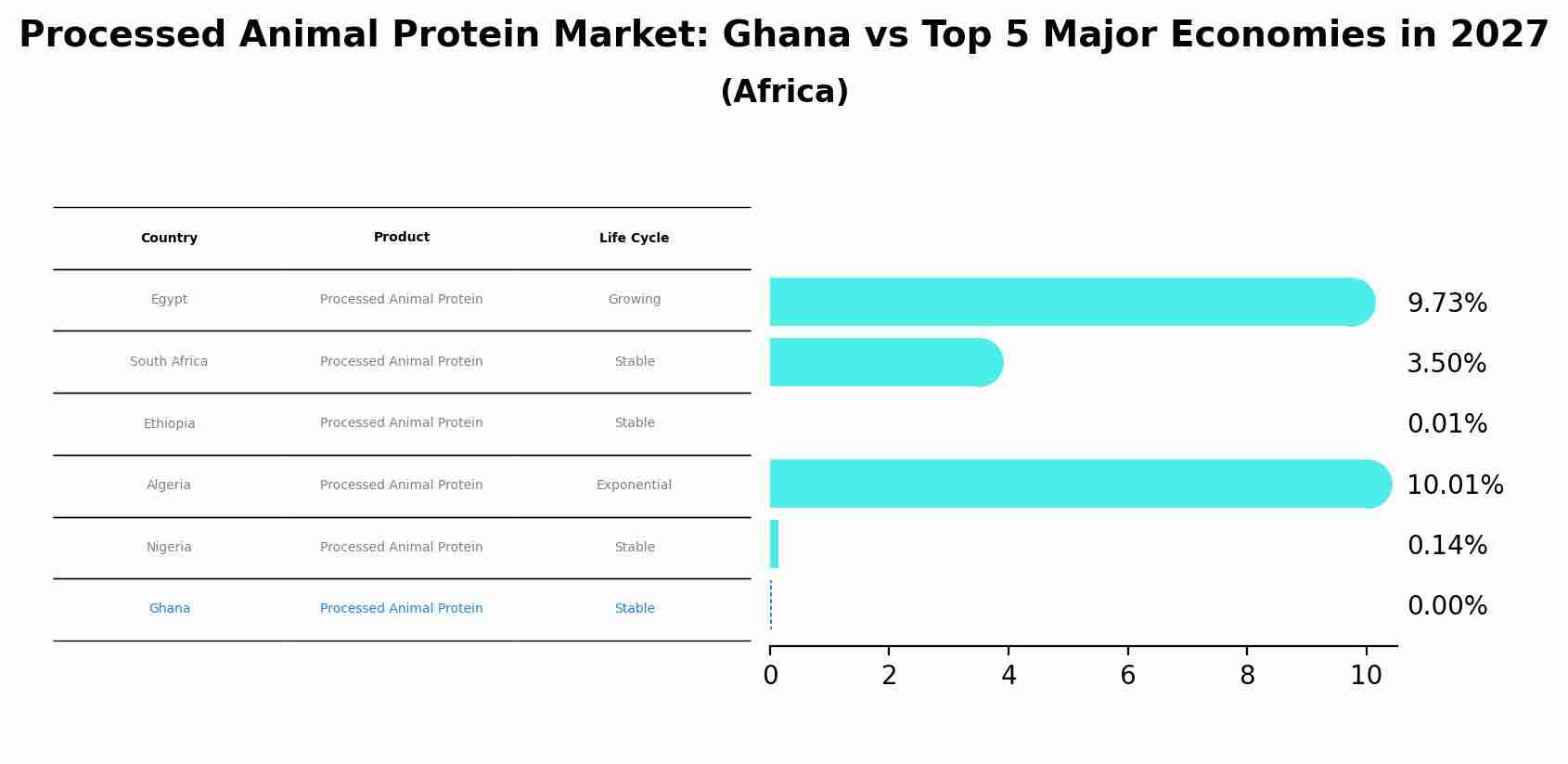Ghana Processed Animal Protein Market (2025-2031) Outlook | Revenue, Trends, Growth, Forecast, Companies, Analysis, Industry, Size, Value & Share
| Product Code: ETC411952 | Publication Date: Oct 2022 | Updated Date: Jul 2025 | Product Type: Market Research Report | |
| Publisher: 6Wresearch | Author: Summon Dutta | No. of Pages: 75 | No. of Figures: 35 | No. of Tables: 20 |
Ghana Processed Animal Protein Market Size Growth Rate
The Ghana Processed Animal Protein Market is projected to witness mixed growth rate patterns during 2025 to 2029. From 0.00% in 2025, the growth rate steadily ascends to 0.00% in 2029.

Processed Animal Protein Market: Ghana vs Top 5 Major Economies in 2027 (Africa)
By 2027, Ghana's Processed Animal Protein market is forecasted to achieve a stable growth rate of 0.00%, with Egypt leading the Africa region, followed by South Africa, Ethiopia, Algeria and Nigeria.

Ghana Processed Animal Protein Market Synopsis
The Ghana processed animal protein market is witnessing steady growth driven by factors such as increasing disposable income, urbanization, and changing dietary preferences towards protein-rich food products. The market offers a wide range of processed animal protein products including processed meat, poultry, and seafood items. Key players in the market are focusing on product innovation, quality control, and distribution to cater to the evolving consumer demands. The demand for convenience foods, rising awareness about the nutritional benefits of animal protein, and the growth of the foodservice industry are also contributing to the expansion of the processed animal protein market in Ghana. However, challenges such as price sensitivity, competition from alternative protein sources, and supply chain disruptions remain significant factors influencing market dynamics.
Ghana Processed Animal Protein Market Trends
The Ghana processed animal protein market is experiencing a shift towards healthier and more sustainable products, driven by increasing consumer awareness of the environmental and health impacts of traditional meat consumption. There is a growing demand for plant-based and alternative protein products, such as soy-based meat substitutes and insect-based protein sources. Additionally, there is a focus on premium quality and ethically sourced animal protein products, with a preference for organic and locally produced options. The market is also witnessing a rise in convenient and ready-to-eat processed animal protein products to cater to busy urban lifestyles. Overall, the trend towards more diverse, sustainable, and health-conscious choices is shaping the future of the processed animal protein market in Ghana.
Ghana Processed Animal Protein Market Challenges
In the Ghana Processed Animal Protein Market, some key challenges are inadequate infrastructure and technology, which hinders efficient production and distribution processes. Limited access to high-quality feed ingredients also poses a challenge for livestock farmers, impacting the quality of the final processed animal protein products. Additionally, fluctuating prices of raw materials and competition from imported processed animal protein products can create pricing pressures for local producers. Furthermore, regulatory issues and compliance with quality standards present obstacles for market players in maintaining consistency and meeting consumer expectations. Addressing these challenges will require investments in infrastructure, technology, and supply chain efficiency, as well as collaboration between industry stakeholders and policymakers to support the growth and sustainability of the processed animal protein market in Ghana.
Ghana Processed Animal Protein Market Investment Opportunities
The Ghana processed animal protein market presents promising investment opportunities due to the country`s growing population, increasing disposable income, and changing dietary patterns towards protein-rich foods. Investors can consider opportunities in the processing and distribution of products such as processed meat, poultry, and fish. With rising health awareness among consumers, there is also a growing demand for value-added and convenience products in the processed animal protein segment. Additionally, the government`s initiatives to promote agribusiness and food processing industries further support investment prospects in this market. Investing in modern processing facilities, technology upgrades, and distribution networks can help capitalize on the evolving consumer preferences and drive growth in the Ghana processed animal protein market.
Jordan Agar Market Government Policies
Government policies related to the Ghana Processed Animal Protein Market focus on promoting food safety, quality standards, and industry regulations. The Ghana Food and Drugs Authority (FDA) oversees the registration and monitoring of processed animal protein products to ensure compliance with safety standards and labeling requirements. Additionally, the Ministry of Agriculture provides support and incentives to local producers to enhance production capacity and quality control measures. The government also encourages partnerships with international organizations to improve technology and best practices in the processing of animal protein products. Overall, these policies aim to boost consumer confidence, stimulate market growth, and ensure the sustainability of the processed animal protein industry in Ghana.
Ghana Processed Animal Protein Market Future Outlook
The Ghana Processed Animal Protein Market is poised for steady growth in the coming years due to increasing urbanization, rising disposable incomes, and changing dietary preferences towards protein-rich foods. The demand for processed animal protein products such as meat snacks, sausages, and canned meats is expected to rise as consumers seek convenient and ready-to-eat options. Additionally, the growing awareness about the nutritional benefits of animal protein and the expansion of distribution networks are likely to fuel market growth. However, challenges such as price volatility of raw materials, competition from alternative protein sources, and regulatory constraints may hinder the market`s full potential. Overall, the Ghana Processed Animal Protein Market is forecasted to experience moderate but consistent growth in the foreseeable future.
Key Highlights of the Report:
- Ghana Processed Animal Protein Market Outlook
- Market Size of Ghana Processed Animal Protein Market, 2024
- Forecast of Ghana Processed Animal Protein Market, 2031
- Historical Data and Forecast of Ghana Processed Animal Protein Revenues & Volume for the Period 2021 - 2031
- Ghana Processed Animal Protein Market Trend Evolution
- Ghana Processed Animal Protein Market Drivers and Challenges
- Ghana Processed Animal Protein Price Trends
- Ghana Processed Animal Protein Porter's Five Forces
- Ghana Processed Animal Protein Industry Life Cycle
- Historical Data and Forecast of Ghana Processed Animal Protein Market Revenues & Volume By Source for the Period 2021 - 2031
- Historical Data and Forecast of Ghana Processed Animal Protein Market Revenues & Volume By Poultry for the Period 2021 - 2031
- Historical Data and Forecast of Ghana Processed Animal Protein Market Revenues & Volume By Pork for the Period 2021 - 2031
- Historical Data and Forecast of Ghana Processed Animal Protein Market Revenues & Volume By Beef for the Period 2021 - 2031
- Historical Data and Forecast of Ghana Processed Animal Protein Market Revenues & Volume By Others for the Period 2021 - 2031
- Historical Data and Forecast of Ghana Processed Animal Protein Market Revenues & Volume By Form for the Period 2021 - 2031
- Historical Data and Forecast of Ghana Processed Animal Protein Market Revenues & Volume By Dry for the Period 2021 - 2031
- Historical Data and Forecast of Ghana Processed Animal Protein Market Revenues & Volume By Liquid for the Period 2021 - 2031
- Ghana Processed Animal Protein Import Export Trade Statistics
- Market Opportunity Assessment By Source
- Market Opportunity Assessment By Form
- Ghana Processed Animal Protein Top Companies Market Share
- Ghana Processed Animal Protein Competitive Benchmarking By Technical and Operational Parameters
- Ghana Processed Animal Protein Company Profiles
- Ghana Processed Animal Protein Key Strategic Recommendations
Frequently Asked Questions About the Market Study (FAQs):
- Single User License$ 1,995
- Department License$ 2,400
- Site License$ 3,120
- Global License$ 3,795
Search
Related Reports
- Vietnam System Integrator Market (2025-2031) | Size, Companies, Analysis, Industry, Value, Forecast, Growth, Trends, Revenue & Share
- ASEAN and Thailand Brain Health Supplements Market (2025-2031) | Strategy, Consumer Insights, Analysis, Investment Trends, Opportunities, Growth, Size, Share, Industry, Revenue, Segments, Value, Segmentation, Supply, Forecast, Restraints, Outlook, Competition, Drivers, Trends, Demand, Pricing Analysis, Competitive, Strategic Insights, Companies, Challenges
- ASEAN Bearings Market (2025-2031) | Strategy, Consumer Insights, Analysis, Investment Trends, Opportunities, Growth, Size, Share, Industry, Revenue, Segments, Value, Segmentation, Supply, Forecast, Restraints, Outlook, Competition, Drivers, Trends, Demand, Pricing Analysis, Competitive, Strategic Insights, Companies, Challenges
- Europe Flooring Market (2025-2031) | Outlook, Share, Industry, Trends, Forecast, Companies, Revenue, Size, Analysis, Growth & Value
- Saudi Arabia Manlift Market (2025-2031) | Outlook, Size, Growth, Trends, Companies, Industry, Revenue, Value, Share, Forecast & Analysis
- Uganda Excavator, Crane, and Wheel Loaders Market (2025-2031) | Strategy, Consumer Insights, Analysis, Investment Trends, Opportunities, Growth, Size, Share, Industry, Revenue, Segments, Value, Segmentation, Supply, Forecast, Restraints, Outlook, Competition, Drivers, Trends, Demand, Pricing Analysis, Competitive, Strategic Insights, Companies, Challenges
- Rwanda Excavator, Crane, and Wheel Loaders Market (2025-2031) | Strategy, Consumer Insights, Analysis, Investment Trends, Opportunities, Growth, Size, Share, Industry, Revenue, Segments, Value, Segmentation, Supply, Forecast, Restraints, Outlook, Competition, Drivers, Trends, Demand, Pricing Analysis, Competitive, Strategic Insights, Companies, Challenges
- Kenya Excavator, Crane, and Wheel Loaders Market (2025-2031) | Strategy, Consumer Insights, Analysis, Investment Trends, Opportunities, Growth, Size, Share, Industry, Revenue, Segments, Value, Segmentation, Supply, Forecast, Restraints, Outlook, Competition, Drivers, Trends, Demand, Pricing Analysis, Competitive, Strategic Insights, Companies, Challenges
- Angola Excavator, Crane, and Wheel Loaders Market (2025-2031) | Strategy, Consumer Insights, Analysis, Investment Trends, Opportunities, Growth, Size, Share, Industry, Revenue, Segments, Value, Segmentation, Supply, Forecast, Restraints, Outlook, Competition, Drivers, Trends, Demand, Pricing Analysis, Competitive, Strategic Insights, Companies, Challenges
- Israel Intelligent Transport System Market (2025-2031) | Strategy, Consumer Insights, Analysis, Investment Trends, Opportunities, Growth, Size, Share, Industry, Revenue, Segments, Value, Segmentation, Supply, Forecast, Restraints, Outlook, Competition, Drivers, Trends, Demand, Pricing Analysis, Competitive, Strategic Insights, Companies, Challenges
Industry Events and Analyst Meet
Our Clients
Whitepaper
- Middle East & Africa Commercial Security Market Click here to view more.
- Middle East & Africa Fire Safety Systems & Equipment Market Click here to view more.
- GCC Drone Market Click here to view more.
- Middle East Lighting Fixture Market Click here to view more.
- GCC Physical & Perimeter Security Market Click here to view more.
6WResearch In News
- Doha a strategic location for EV manufacturing hub: IPA Qatar
- Demand for luxury TVs surging in the GCC, says Samsung
- Empowering Growth: The Thriving Journey of Bangladesh’s Cable Industry
- Demand for luxury TVs surging in the GCC, says Samsung
- Video call with a traditional healer? Once unthinkable, it’s now common in South Africa
- Intelligent Buildings To Smooth GCC’s Path To Net Zero













